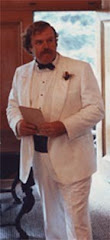After almost 50 hours of listening, tonight I finished the USA trilogy as audio books, read by David Drummond. Strike that. Performed by Drummond.
Dos Passos layered his epic drama about America in the early 20th century with four different narrative strategies: a collage of current events called Newsreel; personal impressionistic prose called the Camera Eye; short bios of important people of the era; and a traditional dramatic narrative following a large number of characters, whose stories intertwine. Drummond brings a different voice to these layers, and to differences within a single layer, giving the reading great variety and interest.
Listening to this trilogy is an experience I put high on my list of memorable audience experiences. Dos Passos' writing is tailored to a dynamic approach like Drummond's, his prose cinematic and theatrical, the broad sweep of his story, which embraces the full demography of our sprawling country, rich and poor alike, made more dramatic by Drummond's different vocal attitudes toward it. His accomplishment here is major. Dos Passos couldn't ask for a better reader.
Yet 50 hours of listening is more dedication than many listeners might be willing to spend. If you listen to just one of these three novels, listen to the last, The Big Money. But if you have the time, go for it. It's an extraordinary ride and reinforces my vote, first made decades ago, for the USA trilogy being as close as we'll ever get to the "great American novel."
The 42nd Parallel
1919
The Big Money
The story strategy here influenced my recent novel. Instead of the Newsreel, I have "CJ Watches the News." Instead of the impressionistic Camera Eye, I have CJ's poems. Instead of the topical bios, I have "CJ's Heavy Reading," defining the intellectual environment of this intellectual man. And finally I have the traditional narrative but focused on one character, CJ himself. From Connell (Mrs. Bridge) I add a construction by vignettes, most chapters a page or less, none over three pages.
The strategy slows down the reading, I think, each vignette "food for thought," the build and relationships developing slowly but effectively (at least for readers who get into it) -- and by the end, the last fifty pages or so, I think the narrative is moving along, driven by new clarity and a need to find out the resolution. Well, that's the theory ha ha , and it works, in this or some other way, for a number of readers, which pleases me. But obviously this is not for the pop lit crowd ha ha. They would find this slow and convoluted, I think.
I think this is as true a book as anything I've written. Of course, "my truth" may not be yours. CJ, my protagonist, feels pretty isolated and lonely until he meets Kayla, re-discovers Emerson and Thoreau, and discovers Lew Welch and James Baldwin, and understands he's not alone, after all.
Monday, March 19, 2012
Subscribe to:
Post Comments (Atom)











No comments:
Post a Comment